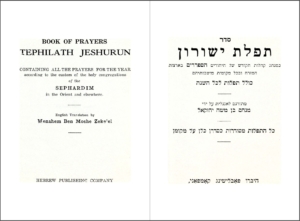Menaḥem-Gershon Glenn (Glemborski) (December 23, 1896-February 26, 1978) was a writer, journalist, editor, and teacher born in Meretsh (Merecz, Merech), Vilna region, Lithuania, the son of Moses Ezekiel and Treine (Tcherback) Glembocki. His father was a teacher of Tanakh. He studied in religious primary schools and in the Musar yeshiva in Shtshutshin (Szczuczyn), and later he began reading worldly literature. He made efforts to write in Yiddish and in Hebrew. In 1914 he emigrated to the United States. He worked in sweatshops, later becoming a teacher. In New York he graduated from an English-language middle school and in 1927 from Columbia University. Thereafter he studied at Dropsie College in Philadelphia, where he received the title of doctor of philosophy in 1945. He first published a story in Bostoner idishe shtime (Jewish voice of Boston), in May 1915. From that point forward, he published stories, sketches, and articles in Yiddish, Hebrew, and English in: Dos yidishe folk (The Jewish people), Idisher kemfer (Jewish fighter), Hatoran (The duty officer), Morgn-zhurnal (Morning journal), the English section of Tog (Day), Hadoar (The mail), Bitsaron (Fortress), Shevile haḥinukh (Paths of education), and Nyu-yorker vokhnblat (New York weekly newspaper). He published a number of books in English and Hebrew. In English: Jewish Tales and Legends (1929); Book of Prayers, "Tephilath Jeshurun," translation 1935 (pseudonym: Menahem B. Moshe Ezekiel); Rabbi Israel Salanter — Rel.-Ethical Thinker (1953). In Hebrew: Al Gedoth Haneyman (short stories, 1936); Hamilon hama'asi (Practical Dictionary Part I, Heb.-Eng., 1947, Eng.-Heb. 1955). In Yiddish: Rashi, der folks-lerer (Rashi, the people’s teacher) (New York: Yidishe lebn, 1940), 78 pp. He worked as an instructor of Hebrew and Tanakh in Graetz College in Philadelphia where he was also a member of Congregation Mikveh Israel and the West Philadelphia Jewish Community Center Club. Among his pseudonyms: Menahem ben Moshe Ezekiel, G. Menakhem, M. Ostrinski, M. Meretski, M. Merkin, M. Bunin, M. G. Treynin, M. Gershon, and M. Giml. He died in Philadelphia. (with gratitude to Dr. Noam Sienna for locating his entry in Who's Who in the East (1956 ed.) and to Joshua Vogel for his compilation of the biographical information provided by Y. Libman, in Nyu-yorker vokhnblat (September 20, 1955) and Sh. Slutski, Avrom reyzen biblyografye (Avrom Reyzen bibliography) (New York, 1956), no. 5158.)












Leave a Reply